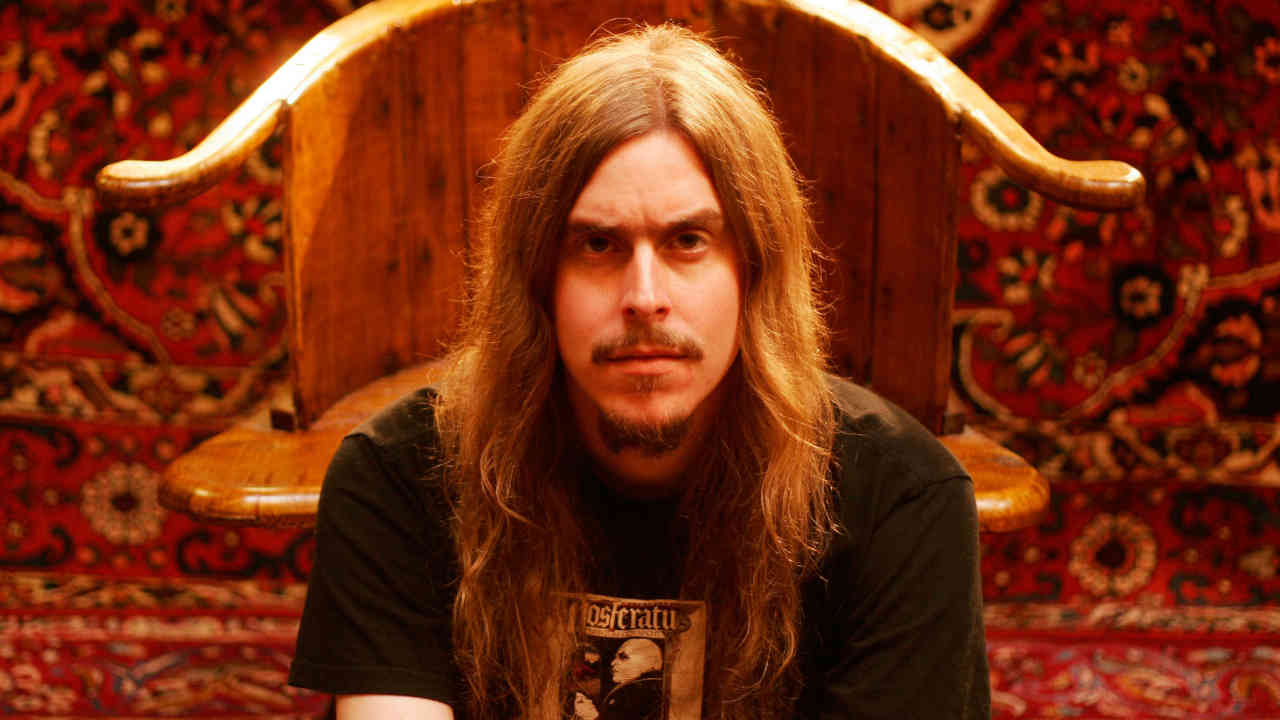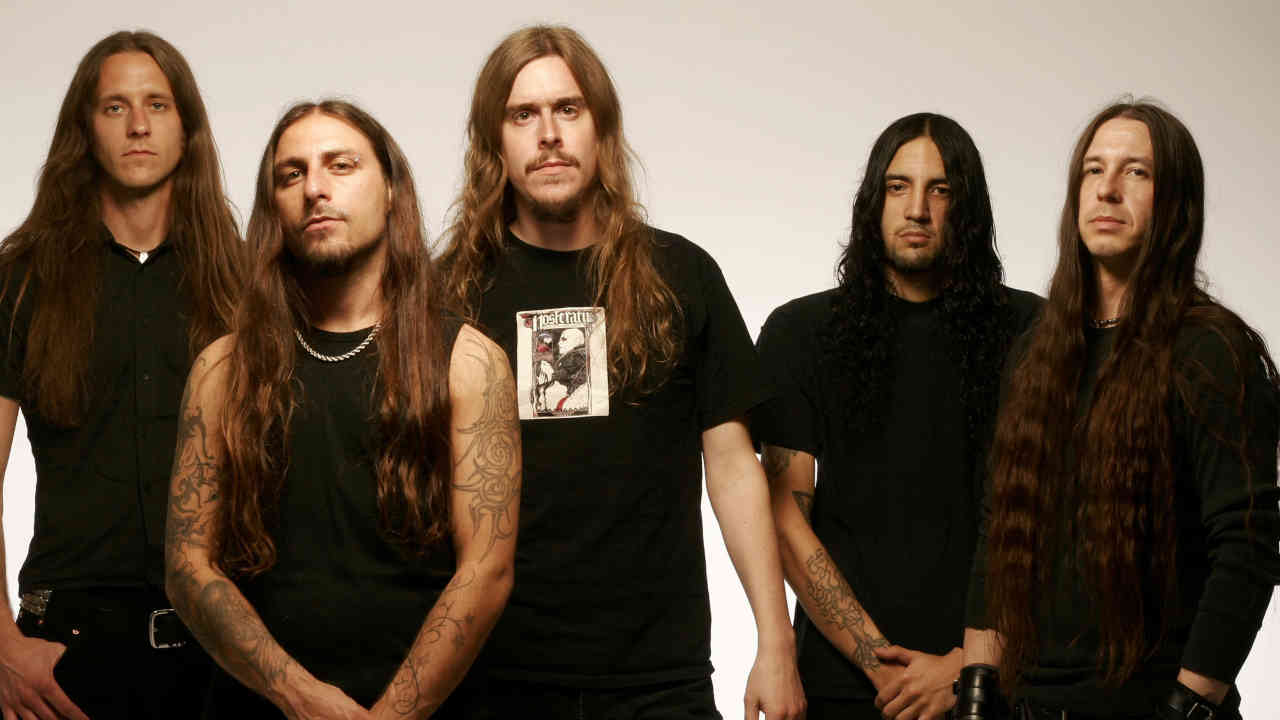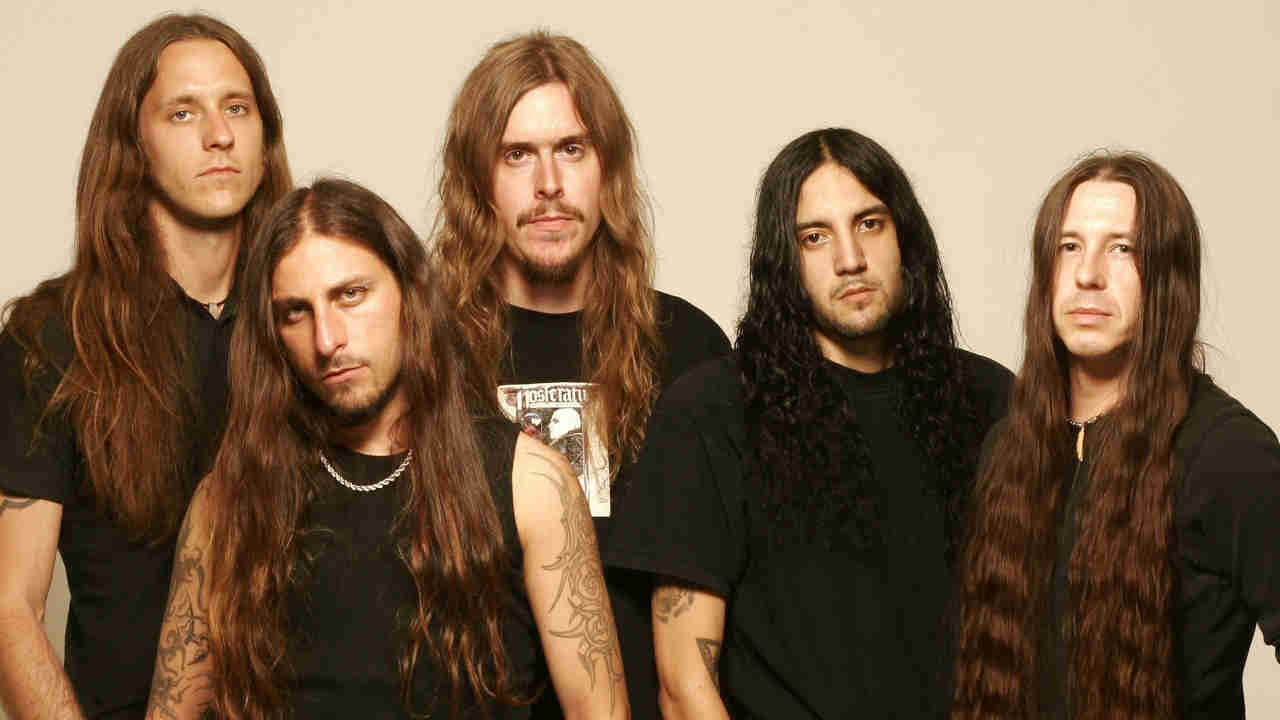Opeth’s 2005 album Ghost Reveries was a turning point for the Swedish prog metal heavyweights, introducing them to a wider audience. As the album was released the band found themselves on the Sounds Of The Underground tour in the US, playing alongside the likes of Lamb Of God and GWAR, which is where Hammer spoke to mainman Mikael Åkerfeldt about being perpetual outsiders.
Shaded from the heat in a small woodland clearing in San Jose, California, Mikael Åkerfeldt, vocalist and guitarist with Swedish prog-metallers Opeth casually reclines on the grass, his eyes masked by sunglasses, a cigarette smouldering in his distinctive toothy grin. A faint breeze rustles the leaves – the atmosphere is serene and peaceful, our actual location betrayed only by the screeching roars belting out of the battered PA system just beyond the tree line.
Backstage at the Sounds Of The Underground tour, Akerfeldt winces as Madball tear their way through a midday set. Already on his fifth interview of the day, the singer and his band are the needle in the haystack of this rolling metal circus that features amongst others Throwdown, Devildriver, Lamb Of God and GWAR. One of the few bands with melodies, one of even fewer with keyboards, and the only act boasting a mid-set ballad, Opeth have surprised, and impressed, everyone. Akerfeldt seems happy to explain what’s up.
Hi Mikael. We can’t help wondering, what are you doing on this tour?
Mikael Åkerfeldt: “That’s our plan with this whole thing: to fit in, but to stand out a mile. A lot of the bands on this tour sound very alike for my taste and we are here to get some new fans and we knew we’d stand out a bit because of the way that we sound.”
And are you happy to sound so different?
“Yeah, I don’t want to be just some other band. We’ve been playing a ballad as part of our set and after it people cheer – all of them – so I think it’s going well.”
How are you getting on with the other bands?
“Great. I have made some really good new friends. High On Fire, Clutch, Devildriver, they are good guys. All the bands are really friendly to the only Swedes.”
Why do you think there’s such an American fixation with Swedes?
“People are obsessed over here with the metal scene from Sweden. I can kind of understand it because there are a lot of bands, but the situation in Sweden is the same as everywhere else. There are handful of great, great bands and then there is a hell of a lot of shit. Maybe we are looked upon as exotic and I guess we have our ‘sound’, but I am as sick and tired of the Swedish scene as I am the UK scene or US scene.”

So how is it being thrown into that scene?
“I don’t think we fit in with any bands on this tour, or any bands, regardless of where they are from. We get a lot of respect from the bands here though. They come up to us and say that they’ve been fans of ours for years and think that we’re the best band on the tour! It might just be talk, but at least they say it.”
No one seems to just ‘like’ Opeth. They either haven’t heard of you, or fucking love you…
“Yeah, I like that. I would hate to have people have a ‘so-so’ reaction to us. I like the fans to be really into what we do because we are. We aren’t based on anything else. We aren’t about image or saying cool things between the songs. Opeth is a musical band.”
Wow, do you think there could ever be an Opeth musical? Is that a style of music that you would consider writing?
“Well, there is no limit with Opeth. It’s not like if we run out of ideas for what we sound like now we are going to go and do rap. We only incorporate styles of music that we like ourselves. That’s what Opeth has been from the beginning, a mish-mash of styles. Why should we limit ourselves? I mean, we aren’t trying to show off but when I write I am paying attention to it and I want to be affected by it.”
Do other bands’ music still ‘affect’ you?
“Of course. I am still on the hunt for really good bands, so I buy more records than I can afford. I am obsessed with our own music and I am obsessed with music over all. I am always looking out for great music but I also like to diss music and talk shit about bands.”
Go on then…
(laughing) “No, not in an interview, just with my friends.”
What is it that most disappoints you about shitty bands?
“I am not disappointed, it’s just my taste. I am sometimes stunned that labels pick up some bands and spend money on them and that they have success. I don’t like many bands actually, the metal scene today is horrible.”
So if you had your way, what direction should it go in?
“Something creative. I am not saying, ‘oh, look at us, look at Opeth’, it’s just that many bands sound alike and labels keep on signing up bands that sound like In Flames or sound like Soilwork. It’s all about money.”
Formed in Stockholm, Sweden in 1990, Opeth have just released their eighth album of magical, prog-metal, experimental rock. Though there are undoubtedly a number of dedicated followers who have been there from the beginning, the band’s rise has been a gradual one, enchanting a few new fans and admirers at each step of their 15 year career. Their latest release, Ghost Reveries, is sure to swell the ranks of devotees, but it has been a long and arduous struggle to the top.
When did people start taking an interest in Opeth?
“It took a while, but that has really been our goal from the beginning, that is everyone’s goal. You start a band and you have those dreams about touring the world. We get to do that now, and that’s great, but it wasn’t always that way. 1996 to 2000 was pretty bad for us, no one took any notice and we didn’t get any tours. We weren’t selling enough to make money, I had some little jobs but I didn’t want to work, I just wanted to commit to music. People deal with challenges differently but, if I am going to be any good at something, I need to really concentrate on it believe if you concentrate on one thing you will end up being good or better at it and Opeth is what I want to do.”
At what point did you decide that?
“When we did the first album, 11 years ago. I thought it was going to be great and we were going to be huge, but obviously that didn’t happen. But I had those dreams from the very beginning. We started when we were still in school and my parents wanted me to get a real job, I said that I wanted to be a musician or open up a record store. They asked whether I had any higher hopes, but I had already decided, pretty early on I guess. It got to the point where I was living without my parents and I was too proud to ask my mother for money. That was basically when I decided that I was going to have to stick to this no matter what. I was poor for a while but then the ball and the band started rolling and now it’s a full-time job.”
What was the big-break moment?
“That was probably when Blackwater Park came out, that was when we got a new record deal and the label put us out on tour and everything was taken care of more professionally. We started to see a little money and we started seeing more support in the US. We did a gig here in 1999 and about 2000 kids came to see us and we realised that we might be able to tour America. For some reason, touring America is every musician’s dream, unless you are American, and then you want to tour Europe. We have done both, we still do both. We are very fortunate.”
What sorts of people come out to see you play in America?
“All sorts. The music is so diverse and we did one album that is not even a metal album. So we have everything from 10-year-old kids to the time we played the Mean Fiddler in London, when there was a guy in the front row screaming along with the lyrics who was about 75-years-old.”

What do you think people of that age see or hear in your music?
“I don’t know. Maybe they think that we sound like Pink Floyd or something. But I think that if you are even slightly interested in music then there is a chance that you might like Opeth. We are more than a metal band. Well, what I mean is that we are a metal band, but there is also more to it than that. I think that anyone that is genuinely interested in music will find something in Opeth that they like. We have been branded an intelligent man’s band, but that’s just talk. I don’t think it’s true, I am sure that we have stupid fans too. Come on, I am stupid, and I like this band.”
Even after 15 years of doing it?
“I love it and I don’t get bored ever. I love our own music, I love music over all and I love playing. That’s where my intelligence lies, all in the music. I am completely self-taught and I don’t know shit about theory but I know music. I couldn’t teach it though.”
You could! Perhaps your passion for it is infectious enough to inspire young minds.
“That’s probably true, we get people every day coming up to us saying that we’ve been really inspirational to them and that my guitar playing is what made them want to play, but that’s a different thing – education and inspiration are totally different things. Education is great but with music you might get to a point where you are so educated that you don’t think anymore, you just do what you’re supposed to do. A combination of that and inspiration would probably be perfect and the greatest, but I am just too lazy to get educated. I would love to go back to school and take History classes, maybe then I can win at Jeopardy!”
What’s the single most important thing people know about Opeth?
“Now that we have signed to Roadrunner people think we are going to sell out – they don’t know what the fuck they are talking about. Opeth will never sell out and do things for money. We won’t change ourselves for cash because this is from the heart. We can’t do it any other way. If people scream, ‘sell-outs!’ every time you start earning or start getting bigger, it’s just because they cant have you in their pockets any more. I didn’t have any doubts about signing because we are so secure in ourselves. I was mildly unsure whether they would do the right job for us, but if they try and get in between the band and try and arrange things, then I will say ‘fuck you’. If that doesn’t work, we’ll just leave.”
Originally published in Metal Hammer issue 143

![Opeth - The Grand Conjuration [OFFICIAL VIDEO] - YouTube](https://img.youtube.com/vi/AY5LRReFYus/maxresdefault.jpg)